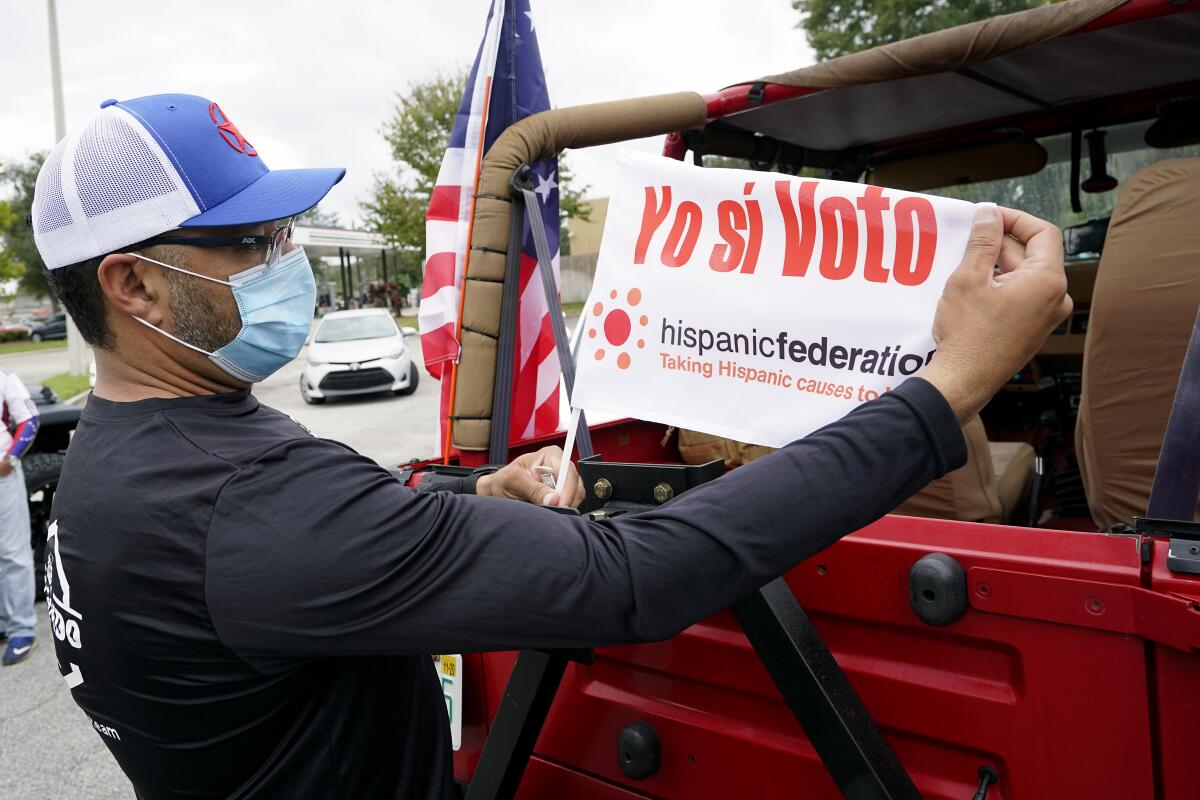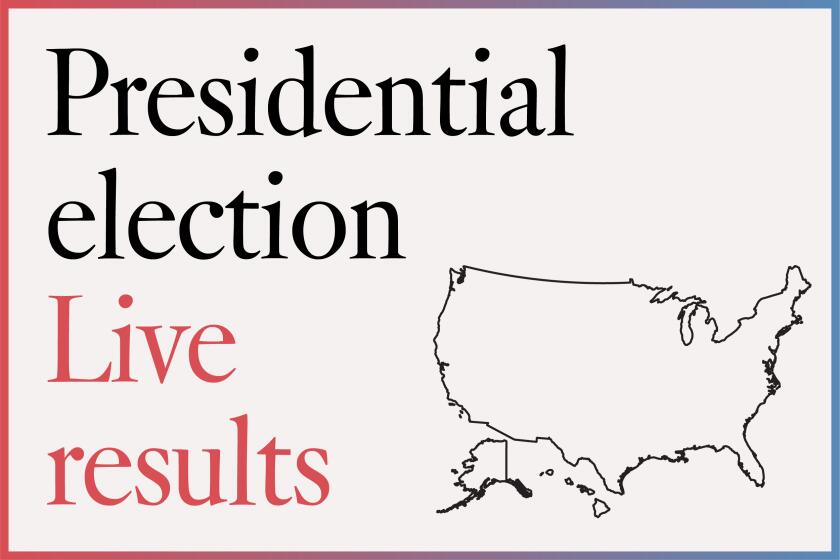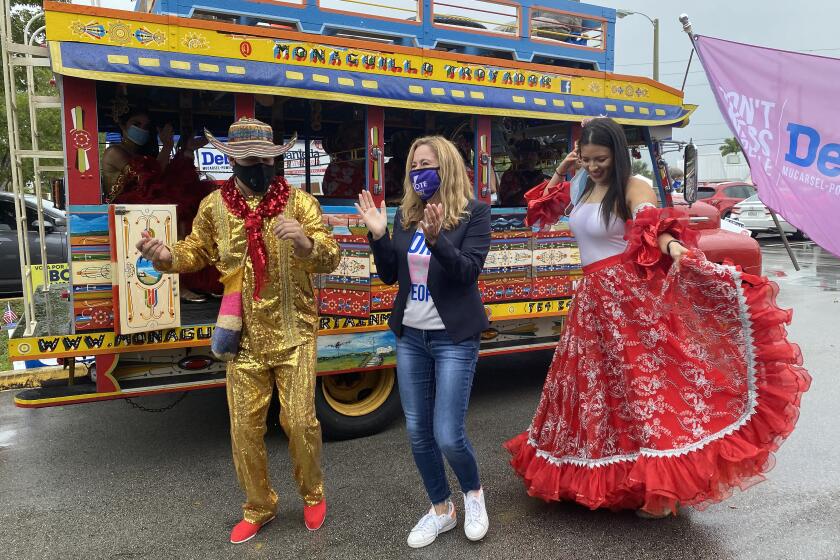Latino voters tired of being taken for granted by baffled Democratic campaigns

As a wild election day came to a close, it became clear that Joe Biden would probably win the Latino vote in every state.
But as it became apparent that the election would not be the resounding victory that many polls seemed to predict, an angst-ridden question arose among many Democrats: Why didn’t more Latinos vote for Biden and why did so many, relatively speaking, vote for Donald Trump, a president with a history of denigrating Mexicans and other immigrants and for being callous toward fellow Americans in a hurricane-ravaged Puerto Rico?
In other words, why didn’t more Latinos vote for the Democrat?
For Chuck Rocha, it was a familiar and frustrating refrain.
“If I have to hear one more ... white person on TV talk about our community not being a monolith,” said Rocha, founder of Nuestro PAC, a pro-Biden group focused on turning out Latino voters. “Last night, it was like the Latino community was listening this whole time and being, ‘Let me just show you how much we are not a monolith.’”
The most obvious example is in South Florida, where Trump picked up nearly half of Latino voters and where Democratic weakness among Cuban American and other Latin American voters cost Democrats two Miami-area congressional districts. Or in Texas, where Biden fell significantly behind Hillary Clinton’s 2016 showing in the heavily Latino precincts of the Rio Grande Valley.
Political strategists and experts pointed to several factors that worked against the Democratic Party, including the lack of a ground game in Texas and an aggressive Republican strategy in South Florida that falsely painted Biden as a socialist. Others said the push to dominate the so-called Latino vote came too late in some places, allowing Republicans to nibble at the margins and narrow the gap.
“What it drove home for me is that the Democratic Party as a whole needs to reevaluate our whole operation on how we reach out to Latinos,” Rocha said.
And yet it grated on him that such a focus from anxious voices on the left could fall on Latinos, when Biden didn’t lose their vote in any state to Trump.
“Me and you are having a conversation about Latinos and why they underperformed, when in fact Joe Biden won Latinos in Florida statewide, while losing white people,” Rocha said. “That’s who we should be talking about.”
It was a point underscored Wednesday by Juan Carlos Huerta, a professor of political science at Texas A&M University Corpus Christi.
“When we see the national data … the Latino population I think overall still voted for Biden. The one big racial ethnic group that didn’t vote for Biden and voted for Trump is white voters,” he said. “A lot of times I don’t think we ask that question: ... ‘How come white people are so Republican?’”
This is all happening amid a fast-paced electoral drama that saw Democrats’ pessimism for taking the White House late Tuesday night turn to nervous hope by early Wednesday — with court challenges an inevitable certainty.
And it’s probable that the story of the Latino vote during election 2020 will be shaded by which side wins, with Democrats lingering less so on any mistakes made if Biden ends up victorious.
Lots of Latinos voted for Trump, and Democrats need to get over that already.
An exit poll conducted for a consortium of television networks indicated that Biden was winning nearly 70% of Latino voters nationwide. Trump was winning about one-third of that group, an improvement over his 28% showing in the exit poll four years ago.
That gap was narrowed in places like Starr County in Texas, where Clinton won 79% of the vote in 2016. This year, Biden won 52% of ballots cast to Trump’s 47%.
While some might be scratching their heads over how that could happen in a county that is 96% Latino, Rocha said that Clinton overperformed compared with Barack Obama there because Mexicans in the Rio Grande Valley were familiar with former President Bill Clinton and his organizing in the state.
“Whereas Latinos I talked to all summer long didn’t know Joe Biden,” said Rocha, who has done political work in Texas for about 30 years. “They knew he was vice president but didn’t know anything about him.”
Huerta said that the gap between Latinos and Latinas, disinformation campaigns and an increasing percentage of evangelical Protestants all likely played a role in how this group voted. He also cited the fact that the U.S. Border Patrol has provided Latinos in the area with good-paying jobs, perhaps blunting the outrage for some over Trump’s harsh rhetoric over illegal immigration.
Lupita Cruz Rios lives in Roma, a small city in western Starr County, and voted for Trump this year and in 2016. The 62-year-old has a nephew who works for the U.S. Border Patrol and supports Trump’s border wall.
Her husband, son-in-law and other relatives work in the oilfields of central Texas and believed their livelihood would be threatened if Trump lost. Her sister-in-law is a Latina activist for the Trump campaign based in Washington, D.C., and Cruz thinks it may have done more successful outreach to socially conservative Latino families like hers in south Texas.
“A lot of people here, [Trump’s] been helping us: Border Patrol jobs, the oilfield,” Cruz said. “We make a living out of that.”
Overall, Biden lost Texas by 6 points, whereas Clinton lost the state by 9.
“How did Biden improve over Clinton’s performance if he underperformed with Latino voters in the state of Texas?” Huerta asked. “That leads me to wonder, is this more of a Rio Grande phenomenon instead of statewide?”
The Biden campaign has mostly done virtual outreach because of the pandemic, but union members and others have moved to Arizona to knock on doors.
Meanwhile, in Arizona, Biden’s apparent win was credited to Democratic gains among Latinos. Rocha said there was “a real operation on the ground by Latino-led organizations in the state for a long period of time.”
Add to that the fact that a generation of organizers had fought back against former Sheriff Joe Arpaio and controversial Senate Bill 1070 — which directed police to demand the papers of people suspected of being in the country illegally.
Biden also pumped “real resources there, on TV and radio,” Rocha said.
The strength of Trump’s appeal to Latino voters was especially evident in Florida, where an exit poll showed Trump with 47% of the group’s vote to Biden’s 52%. Republicans there seized on the threat of socialism, which has considerable resonance in South Florida — a place made up of refugees who fled dictatorships, including leftist ones.
“That’s the message that works. It was untrue, but it worked,” said Eduardo Gamarra, a professor of politics and international relations at Florida International University. “Republicans ... knew where the susceptibilities were.”
Evelyn Pérez-Verdía, a Democratic Latino issues strategist, attributed the increase in Latinos voting for Trump to disinformation that is rampant in the state, as well as the “ghost of Castro-Chavismo” — a reference to late Cuban and Venezuelan dictators Fidel Castro and Hugo Chavez. If it wasn’t socialist labeling, it was the Democratic Party being falsely labeled as violent, she said.
An ad from the Trump campaign that aired in Spanish on a Miami-area radio station painted Democrats as “puppets of the radical left, a gang that prefers anarchy and chaos.”
“We all escaped violent countries,” Pérez-Verdía said. “If there’s something we all have in common in Latin America … most countries, we have lived violence.”
As the presidential election nears, Democrats and Republicans are targeting Florida’s other Latino voters, not just Cuban Americans and Puerto Ricans.
“We need to really focus on doing some in-depth studies of our communities year-round in Florida and other communities nationwide,” she added. “It would help from campaigns to government to really understand the subcultures of our cultures.”
Charles Gerow, a GOP political strategist, said Latinos helped propel Trump “to an unexpectedly large victory in the Sunshine State. He cited socialism as top of the list of concerns for those voters — not immigration. He said many Latino voters also supported Trump’s economic policies.
“You saw President Trump doing very, very well in the minority community, despite all the chatter in the national media about his offensive personality and racist instincts,” said Gerow, who is Brazilian American. “People just didn’t buy that — the minority community didn’t buy it, anyway.”
On Tuesday night, as Rocha researched House and Senate races, he said he could not find Latinos who served as campaign managers. Also missing were Latinos who worked as TV, mail and digital consultants on races.
“So you expect for us to vote for you and to have a voice in these campaigns,” he said, “when we literally don’t have a voice in these campaigns.”
Times staff writers Molly Hennessy-Fiske and Kate Linthicum contributed to this report.
More to Read
Get the L.A. Times Politics newsletter
Deeply reported insights into legislation, politics and policy from Sacramento, Washington and beyond. In your inbox three times per week.
You may occasionally receive promotional content from the Los Angeles Times.


![Alex Rosado, a member of Unite Here Local 11 in Los Angeles, is hitting the streets as a canvasser in Phoenix, Ariz., for the rest of the election cycle to turn Arizona blue in the presidential election. "I want to make sure that I'm one of the people responsible for getting [Trump] out of office." Photo courtesy of Maria Hernandez.](https://ca-times.brightspotcdn.com/dims4/default/97e370d/2147483647/strip/true/crop/1386x924+75+0/resize/840x560!/quality/75/?url=https%3A%2F%2Fcalifornia-times-brightspot.s3.amazonaws.com%2Fbc%2Fb4%2Ffadf46e64e4fba157ce302e408f0%2Fla-pol-na-pol-2020-arizona-democratic-volunteers01.JPG)











